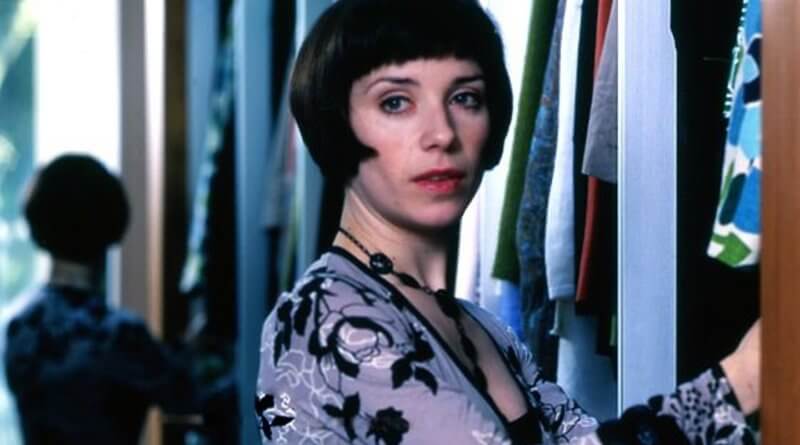Review: Shiny, Shiny Bright New Hole in My Heart (2006) ★★★★
Some films succeed on a purely visceral level. I tend to shy away from these kinds of stories, like romantic comedies or tear-jerkers, as they seek to produce overly-emotional reactions. I think they bother me so much because they are a practice of conscious deceit. I enjoy escaping into fantasy as much as the next person, but many genre films produce emotion by lying about human nature or using dumb, trite analyses of life in general. Realism is not always necessary, but when surrealism is used in place of it, while still under the guise of realism, I find the end result to be unbearable. Emotional effect is not inherently bad, and this is especially true when the effect is not altogether positive, at least in the traditional sense of the word. Of course, this end of the spectrum also has its limits. Being negative just for the sake of negativity is perhaps even less bearable; more often than not it comes across as naive angst, devoid of any artistic form, but I digress. The point of all this is to say that some films are able to intentionally produce an emotional effect without subverting realism or abandoning artistic integrity; Mark Munden’s Shiny, Shiny Bright New Hole in My Heart manages to do just that.
To call it a “TV Movie” is technically accurate, but not altogether helpful. Produced by the BBC, Shiny, Shiny Bright New Hole in My Heart first aired on BBC 2 in July of 2006, and though it is shot on a modest budget, it feels more like an independent theatrical release than a made-for-TV movie. The story follows Nathalie (Sally Hawkins), a personal shopper for a department store. She is married to Jeremy (Steven Mackintosh), a successful doctor, and the couple live together in London with their young daughter. Unfortunately, Nathalie is a compulsive shopper, and her spending habits are only exacerbated by her occupation and her newly formed friendship with a wealthy client named Maya (Daniela Nardini). Nathalie attempts to keep her obsession a secret, but soon her debt spirals out of control, putting her future and the future of her family at risk.
Before I expound on everything that Shiny, Shiny Bright New Hole in My Heart does well, I must confess that many viewers will take issue with the level of agitation the film stirs up. The protagonist allows herself to be completely consumed by the thrill of buying. She spends without need and without any regard for price. Sure, her husband is a successful doctor, and the family is not wanting for money, but, as with any family’s budget, the credit cards can only take so much. As the situation escalates, and Nathalie’s desperation to conceal her secret life reaches a fever pitch, the audience is forced to endure the uncomfortable situation ad nauseam. Writer/Director Marc Mundon seems to revel in making us squirm alongside Nathalie. Even if a viewer has never faced financial hardship, debt, or an obsessive need to spend, it is difficult to watch the troubled heroine make horrible decisions, one after the other, without an ounce of self control. Though her mental state initially deserves compassion, at a certain point one cannot help but despise her for the needless hardship she has inflicted on her husband, who despite everything, generally still affords her sympathy and understanding.

While the story may leave some viewers anxious, the film should be commended for embracing realism so completely. Nathalie’s flights of fancy are never sensationalized, nor are the harsh realities downplayed whenever the credit card bill arrives. She must hide the evidence from her husband and beg for money from anyone who will listen, all while keeping up appearances for the sake of her image and sanity. Sally Hawkins portrays this woman on the verge of self-annihilation with expert precision. The camera focuses closely on her dumbstruck expressions as Jeremy tries to contain her excesses. Her anguish is visible, juxtaposed with the manic joy of spending; she jumps from low to high and back again so naturally, as if Hawkins has lived the character before. Steven Mackintosh is equally talented as the husband, who must decide how best to handle his wife’s sickness, with compassion or force.
Despite its rather quiet, contemplative approach to the subject matter, Shiny, Shiny Bright New Hole in My Heart is an emotionally taxing experience. It takes the rather bland topic of credit card debt and turns it into a silent antagonist, slowly unravelling the lives of Nathalie and her family. Through excellent performances, a strong script grounded in reality, and quality filmmaking practice that belies its status as a “TV movie,” Shiny, Shiny Bright New Hole in My Heart is a must-watch film.
Rating: ★★★★ out of 5
Shiny, Shiny Bright New Hole in My Heart is currently available to rent, purchase, or watch for free via Amazon Prime here.

